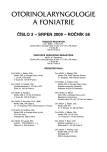Uvulopalatopharyngoplasty Combined with Radiofrequency Thermotherapy of Tongue Base in the Therapy of Obstructive Sleep Apnea Syndrome
Authors:
J. Plzák 1,2,3; M. Zábrodský 1; J. Kastner 1; J. Klozar 1
; J. Betka 1
Authors‘ workplace:
Klinika otorinolaryngologie a chirurgie hlavy a krku 1. LF UK a FN Motol, Praha
Katedra otorinolaryngologie IPVZ, Praha
; přednosta prof. MUDr. J. Betka, DrSc.
Anatomický ústav 1. LF UK, Praha
1; přednosta prof. MUDr. M. Grim, DrSc.
Centrum buněčné terapie a tkáňových náhrad 2. LF UK, Praha
2; vedoucí prof. MUDr. E. Syková, DrSc.
3
Published in:
Otorinolaryngol Foniatr, 58, 2009, No. 3, pp. 140-143.
Category:
Original Article
Overview
The aim of this study was to evaluate the efficacy and safety of single-session uvulopalatopharyngoplasty (UPPP) with radiofrequency thermotherapy of the base of the tongue for the treatment of obstructive sleep apnea syndrome (OSAS). 59 patients with multilevel obstruction underwent single-session surgery. Snoring, Epworth sleepiness scale (ESS) and sleep study were used to assess outcome before and 3-6 months after treatment. Snoring level decreased from 8.2 to 6.1 (visual analog scale 0-10). The mean ESS score decreased from 10.5 to 7.4. The mean apnea-hypopnea index decreased significantly from 28.9 to 14.2. The overall success rate of the single-session UPPP with radiofrequency thermotherapy of the base of the tongue was 45.5%. There were several adverse effects, four ulcerations of the base of the tongue with spontaneous healing, two revision surgery interventions for bleeding after tonsillectomy included in UPPP and one transient taste change. Single-session UPPP with radiofrequency thermotherapy of the base of the tongue is an effective and safe treatment for OSAS patients with multilevel obstruction.
Key words:
uvulopalatopharyngoplasty, radiofrequency thermotherapy, obstructive sleep apnea syndrome.
Sources
1. Eun, Y. G., Kim, S. W., Kwon, K. H., Byun, J. Y., Lee, K. H.: Single-session radiofrequency tongue base reduction combined with uvulopalatopharyngoplasty for obstructive sleep apnea syndrome. Eur. Arch. Otorhinolaryngol, roč. 265, 2008, s. 1495-1500.
2. Farrar, J., Ryan, J., Oliver, E., Gillespie, M. B.: Radiofrequency ablation for the treatment of obstructive sleep apnea: a meta-analysis. Laryngoscope, roč. 118, 2008, s. 1878-1883.
3. Foltán, R., Hoffmannová, J., Pretl, M., Donev, F., Vlk, M.: Genioglossus advancement and hyoid myotomy in treating obstructive sleep apnoea syndrome - A follow-up study. J. Craniomaxillofac. Surg., roč. 35, 2007, s. 246-251.
4. Foltán, R., Rybínová, K.: The impact of mandibular advancement on the upper airway patterns—cephalometric study. Prague Med. Rep., roč. 108, 2007, s. 147-154.
5. Hörmann, K., Verse, T.: Surgery for sleep disordered breathing. 1. vyd., Berlin, Springer, 2005, 161 s., isbn 978-3-540-21951-4.
6. Plzák, J., Klozar, J., Betka, J.: Obstrukční syndrom spánkové apnoe: diagnóza a léčba. Otorinolaryng. a Foniat. /Prague/, roč. 51, 2002, s. 216-220.
7. Powell, N. B., Riley, R. W., Guilleminault, C.: Radiofrequency tongue base reduction in sleep disordered breathing: pilot study. Otolaryngol. Head Neck Surg., roč. 120, 1999, s. 656-664.
8. Sher, A. E., Schechtman, K. B., Piccirillo, J. F.: The efficiency of surgical modifications of the upper airway in adults with obstructive sleep apnea syndrome. Sleep, roč. 19, 1996, s. 156-177.
9. Šonka, K. a kol.: Apnoe a další poruchy dýchání ve spánku. 1. vyd., Praha, Grada, 2004, 247 s., isbn 80-247-0430-7.
Labels
Audiology Paediatric ENT ENT (Otorhinolaryngology)Article was published in
Otorhinolaryngology and Phoniatrics

2009 Issue 3
Most read in this issue
- Uvulopalatopharyngoplasty Combined with Radiofrequency Thermotherapy of Tongue Base in the Therapy of Obstructive Sleep Apnea Syndrome
- Czech Version of the Voice Handicap Index Questionnaire for Quantitative Evaluation of Voice Problems Perceived by Patients
- Pyoderma Gangrenosum as a Sign of Extraintestinal Manifestation of Crohn Disease in ENT Region
- Long-term Results of the Sentinel Lymph Node Biopsy in Patients with Oral Cavity Carcinoma
